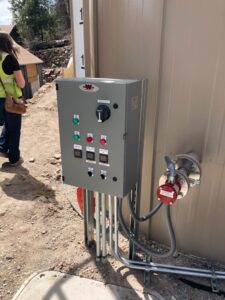The Importance of Accurate Temperature Control
Last updated on May 16th, 2025 at 02:54 am
Many industrial settings will suffer extreme consequences when temperature controls fail. There are certain risks of inaccurate temperature control, but there are ways AI technology can provide better, more reliable solutions for industrial settings.
How temperature controls can fail?
Without AI technology to help manage temperature control panels, it’s impossible for humans to constantly be aware of the temperature changes and whether or not the temperature controls are functioning properly. There’s the chance that while employees are doing other work, the temperature of something important is slowly creeping out of control.
The problem with temperature controls that aren’t using AI technology is when there’s a malfunction, or once the temperature is being affected, it won’t be able to make a decision on its own or send out an alert for maintenance. The slightest temperature changes can ruin production quickly.
On top of that, once the problem has been discovered, it takes a while to get back on track. Temperature control panels using AI technology can adapt quickly, sense changes, and learn from their history to make decisions before a problem arises.
Why temperature control is important to metals?
Temperature control is essential to production concerning chemicals, delicate materials, and fluids needing a certain viscosity or composition. In industrial settings, temperature controls can be placed in areas the employee might not be able to reach, delivering information that would otherwise be elusive.
For various metals, temperature changes can have a huge impact on the material and how it can be used (or not used). In rising temperatures, metals experience thermal expansion: an increase in their size and volume. This applies to metals in two scenarios: one, metals that make up the equipment doing the work, and two, metals being used to produce something.
Either way, if the temperature rises too much and the metal expands, it either ruin the equipment or the production. This can affect which metals are used in an industrial setting.
Metals will also experience resistance, which happens in cold and hot temperatures. Resistance is when electrons move through metal, bouncing off other electrons and the boundaries of the metal. Heat increases the speed of the electrons’ movement which increases the resistance. Cold slows down the kinetic energy in the electrons and reduces resistance levels.
The magnetism of a metal can also change based on its temperature. Some metals at a higher temperature will slowly lose their magnetization until they lose it completely when the Curie temperature is met. Different metals have unique Curie temperatures (the temperature at which they lose all magnetism). This can impact what metals need to be used in high temperatures, or at what temperature metals need to be kept to manage their magnetism.
Also Read: Thermistor vs Thermocouple
Low-temperature challenges to materials
Lower temperatures will lead to a loss of ductility in materials. Ductility refers to a material’s ability to undergo deformation before fracturing. Materials kept at low temperatures become more brittle and at risk of deforming. Shattering is more likely to happen.
High-temperature challenges to materials
Higher temperatures can lead to materials losing their tensile strength. They can also become over-tempered which leads to reduced fatigue resistance. Some materials will completely change at high temperatures. For example, some lubricants will lose their lubrication abilities, and some chemicals will change their composition. These unintended changes can lead to explosions, unwanted reactions, equipment failure, or simply a loss of product.
Use reliable temperature control panels
Along with the temperature sensor tools, such as RTD and thermocouples, Wattco’s control panels will ensure maximum heat generation safety for various voltage ranges. Industrial control panels regulate temperature and provide safety mechanisms to prevent overheating your liquid and protect your heating elements. Browse temperature control panels here.
